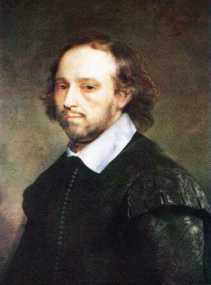
William Shakespeare
(My complete GMD bio/commentary
is here).
Bibliography
Almost everything we know of George MacDonald's affection toward Shakespeare (or Shakspere if you like) comes by way of two essays in A Dish of Orts, and in his commentary: The Tragedie of Hamlet (with a study of the text of the Folio of 1623). A flop when first published in 1885, it is now considered by many Shakespearian specialists to be a first rate critique and interpretation of its subject, not because of MacDonald's extrapolation of facts and any analysis of those facts, but because of his understanding of both Shakespeare and his character, Hamlet, whom MacDonald considered to be the most noble character in all of fiction. His opening paragraph in the book's preface says:
By this edition of HAMLET I hope to help the student of Shakspere to understand the play--and first of all Hamlet himself, whose spiritual and moral nature are the real material of the tragedy, to which every other interest of the play is subservient. But while mainly attempting, from the words and behaviour Shakspere has given him, to explain the man, I have cast what light I could upon everything in the play, including the perplexities arising from extreme condensation of meaning, figure, and expression.
MacDonald interprets many facets of Hamlet very differently from that of most scholars. Take the following well known passage for instance:
_Ham._ And therefore as a stranger giue it welcome.
There are more things in Heauen and Earth, _Horatio_,
Then are dream't of in our Philosophy But come,
Here as before, neuer so helpe you mercy,
How strange or odde so ere I beare my selfe;
(As I perchance heereafter shall thinke meet
To put an Anticke disposition on:)
That you at such time seeing me, neuer shall
With Armes encombred thus, or thus, head shake;
MacDonald gives this analysis of the passage:
This idea, hardly yet a resolve, he afterwards carries out so well, that he deceives not only king and queen and court, but the most of his critics ever since: to this day they believe him mad. Such must have studied in the play a phantom of their own misconception, and can never have seen the Hamlet of Shakspere. Thus prejudiced, they mistake also the effects of moral and spiritual perturbation and misery for further sign of intellectual disorder--even for proof of moral weakness, placing them in the same category with the symptoms of the insanity which he simulates, and by which they are deluded.
To this day most critics of Hamlet consider the lead character to be insane. MacDonald would think the same of those critics.
Shakespeare no doubt influenced many aspects of George MacDonald's writing, probably more so his poetry than anything else, although one would be forced to admit that just as Shakespeare would never match MacDonald in writing fantasy, neither would MacDonald ever be the poet Shakespeare was.
We don't know with absoluteness what MacDonald thought of the Shakespearean authorship controversy (especially where Oxford is concerned), but we do have the thoughts of his son, Greville, on the matter of Bacon which he included in his father's biography when speaking of having met and become friends with the Rev. George B. Bacon in New Jersey during the MacDonald lecture tour of the USA:
-
Son of the celebrated Leonard Bacon, and nephew of Delia Bacon who instituted the Shakespearean controversy and lost her reason over the cryptic system she discovered in the Plays and Sonnets.